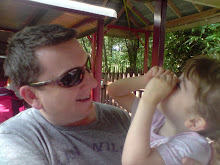
Last weekend I read the book "The Shack" by Wm Paul Young. This book has been number 1 best seller in the New York Times charts, and has even broken into the top 100 at WHSmith in the UK.

It is a controversial book in a lot of ways, particularly in its depiction of God the Father appearing to Mack (the central character) as a black African-American woman.
"The Shack" is endorsed by leading evangelicals, including Eugene Peterson (The Message) and Michael W. Smith from the USA and the evangelist J. John in the UK. Equally, it has been derided as Heresy by others, including Mark Driscoll (Mars HILL Church, Seattle) who I count amongst my Christian heroes.
What did I think of it? Well, at the risk of offending somebody - here goes....
Without giving the whole story away, the plot follows Mack, whose daugther Missy is abducted and murdered. For the following few years Mack is enveloped by "The Great Sadness." One cold winters morning he receives a letter from God inviting him back to the shack where his daughter is believed to have been murdered, though her body was never found. At the shack, Mack meets God - Father Son and Holy Spirit, and over the course of a weekend, his encounter with them transforms his life.
First - lets get the difficult and dodgy stuff out of the way. I found the depiction of the Father (Papa) as a black woman more than difficult to deal with. The first person of the Trinity is depicted throughout Scripture as a Father. In "The Shack", God explains that He is Spirit, and that any depiction of Him in human terms is purely for our benefit. In Scripture, there are ocassions where God shows clear 'feminine' characteristics, such as Jesus using the image of a mother Hen protecting her chicks, and defining his heart for Jerusalem in that picture. In the Old Testament, God is depicted as a mother desiring to breast feed and nourish her children. In Creation we read that God created Male and Female in His image. There is no doubt that it is the 2 together - Male and Female, that give completion to the image. God is neither Male nor Female, but Spirit. However, we have no Biblical mandate to present Him as a woman, and I found the image in the book deeply troubling.
Mark Driscoll's comments are interesting, and can be found on You Tube. However, having rewatched his comments after reading the book, I dont believe that he had read the book when he critiqued it. For example, he accuses the author of the heresy of 'modalism' (look it up - come on - do some of the work yourself!) He uses 1 quote to support this claim. The charge is not verified by a reading of the book.
The 1 other area that did trouble me though, was the possible suggestion of Universalism (that all will be saved whatever.) This is by no means explicit, but could be implied in a number of places. Particularly in one section where Jesus tells Mack that his followers come from all walks, races, political parties and religions - Hindu, Muslim, Mormon, etc. I re-read the section, and it seems to be deliberately ambiguous. Certainly people will follow Jesus from every tribe, people, tongue and nation, but they will have to come to Him as the only Saviour. The section in question has Mack mention about people being Christians, and Jesus responds "I never mentioned becoming a Christian!" It is deliberately ambiguous. However, the rest of the book seems to clearly suggest that if people want to know God, they must enter into a relationship with Him through Christ.
However (and you cant ignore the dodgy stuff - that's why I mention it), I was deeply moved by the book. I have no doubt that at times I had fresh insights into my relationship with God.
A couple of examples. Young's potrayal of "The Great Sadness" is just brilliant. Anyone who has had a deep sad, life changing (Life-numbing) experience will identify with it. His depiction of this cloak of despair is true to life, and many will see themselves in it.
The way in which Young deals with "The Great Sadness" is also brilliant. In a "Judgement" scene, God invites Mack to be Judge and Jury on his own children. He is told to choose 2 to go to Heaven and the others to destine to hell. He pleads with God "Let me take their place - let me go instead of them!"
"Now you sound like Jesus - you have Judged well" comes the reply!
In the book, there is also a wonderful depiction of Jesus at the centre of all things, with Creation and the redeemed gathering to worship Him. The scene that follows moved me to tears as Young writes... "Everything that had breath sang out a song of love and unending thankfulness. Tonight the universe was as it was intended!"
The last thing that I will mention is that the book deals as well as any (fictional book) with the issues of forgiveness and anger and bitterness. There is much Biblical wisdom in the way Mack is led to address the brokeness and pain in his own heart and family.
"The Shack" was a good read, moving, inspiring, and ultimately I would recommend it with the proviso that you read it as a piece of fiction, and not a systematic theology.





No comments:
Post a Comment